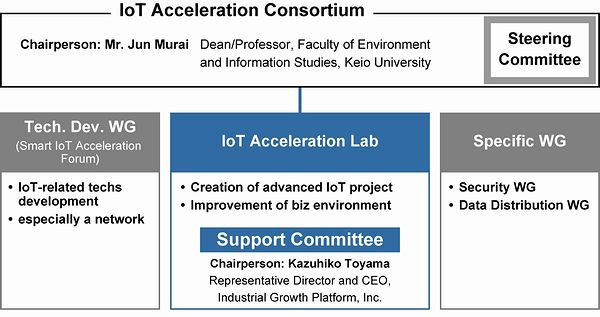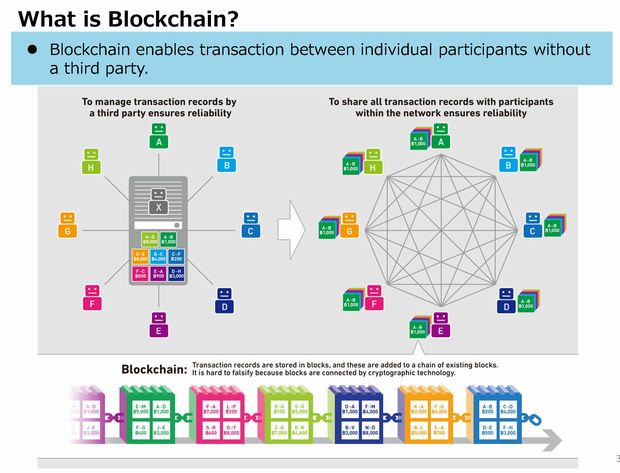- Home
- Policies
- Policy Index
- Information Economy
Information Economy
METI has begun initiatives to promote advanced projects which utilize IoT and other technologies, offer support for regulatory and systemic reform, establish rules and guidelines to facilitate data utilization and consider responses to newly emerging blockchain technologies and the sharing economy concept in order to develop a better innovation environment to respond to changes in the competitive environment for companies and changes in industrial structures led by advances in IoT and AI.
- IoT Acceleration Consortium
- Commerce, Distribution and Information Committee, Industrial Structure Council
- Personal Information Protection Initiatives
- Digital Platforms
- Latest Policy Updates on Digital Platforms in Japan
- Electronic Commerce
- E-Commerce Market Survey
- Blockchain Technologies
- Initiatives Relating to the Sharing Economy
- Cloud services
- Reference (initiatives to date)
IoT Acceleration Consortium
The IoT Acceleration Consortium was established on Friday, October 23, 2015 as a private-sector-led organization tasked with facilitating the utilization of IoT, big data and AI in industry-academia-government collaboration beyond the frameworks of individual companies or business areas in response to the emergence of these technological frameworks. The Consortium has been working to facilitate technological development and the use of new technologies, promote the creation of new businesses in Japan and strengthen the international competitiveness of Japanese companies, and has also provided recommendations for solving various policy issues. Membership has increased from around 700 initially to around 2,400 at present.

Commerce, Distribution and Information Committee, Industrial Structure Council
There is an urgent need to promote the utilization of advanced technologies such as IoT, big data, and AI to create new business and value and encourage diverse and unrestrained innovation in the development of digital businesses which break existing paradigms.
The realization of these will revitalize the economy and will lead to a more secure and affluent life. The Subcommittee has been discussing ideal systems, security measures and other foundations for the development of human resources and technology necessary to promote digital businesses in light of the advancement and dissemination of IT.
WG on Distribution Strategy (chaired by Prof. Kokuryo of the Faculty of Policy Management at Keio University)
The Working Group is discussing the adoption of an autonomous, distributed and coordinated structure as Japan's new strategic axis in accordance with the advancement of technologies such as IoT, big data, and AI and is considering necessary technological strategies and systems. We compiled an interim report in November 2016 as well as an English translation of the outline, which is posted below.
Personal Information Protection Initiatives
Protecting personal information has become increasingly important with the progression of IT.
At present, a large and diverse group of business operators possess customer data and other personal information. The advancement of information processing techniques has made it possible to store, distribute, process and edit this information easily. Thanks to modern networks, information travels worldwide almost instantly. If used properly, this information handling is very useful in business, but inappropriate management of information by business operators has already resulted in the leakage of customer data. Even in cases where no specific damage has been caused by these leaks, many people are uncomfortable with their inability to learn who has their personal information and how it is being used or managed. This anxiety concerning the protection of personal information is one of the obstacles hindering people from participating in e-commerce. Many internet users do not utilize e-commerce. The commencement of the Basic Residential Registers Network System in FY2002 raised public awareness of personal information protection.
On April 1, 2005, the Act on the Protection of Personal Information entered into full effect, requiring business operators to handle all personal information properly.
METI has established and reviewed guidelines that stipulate business operator obligations under the Act in a more concrete and detailed manner with the aim of encouraging the facilitation of personal information protection efforts by the business operators and industry groups under its jurisdiction, thereby raising the profile of the Act and the guidelines and raising awareness among the relevant parties in economic and industrial areas.
Press Releases
Reference
Related link
Digital Platforms
In recent years, digital technology-based trading has dramatically been improving users’ access to markets, and digital platforms, in particular, have been playing a significant role in such trading. Meanwhile, some concerns have been raised over digital platform markets, such as transparency and fairness.
Against this backdrop, METI has been advancing development of rules for markets surrounding digital platforms, the building of a framework for helping stakeholders share challenges that they are facing, and conducting comprehensive surveys for digital markets that are changing dramatically.
For further information, please click the following image.
Latest Policy Updates on Digital Platforms in Japan
Electronic Commerce
E-commerce has the advantage of enabling increased participation in the economy without fewer time and location restrictions and has therefore been expanding greatly in recent years. Transaction rules have been developed through the enactment of new laws and amendments to existing laws coinciding with the expansion of e-commerce. However, changes in the Internet environment have outpaced the law, creating situation in which the succession of new paradigms has reduced the applicability of current legal provisions. In order to ensure that the e-commerce market, which is expected to continue to expand in the future, is safe for all participants, it is necessary to increase predictability by clarifying the interpretation of laws and regulations and applying them to newly emerging situations. METI is taking various measures to further promote e-commerce.
Interpretative Guidelines on Electronic Commerce and Information Property Trading
E-commerce is continuing to expand and transaction methods are diversifying with technological advancements. Economic activities targeting information distributed over the Internet have also become increasingly widespread. The Civil Code and other existing laws are not necessarily up to date with these online transactions and there are cases in which the interpretation of the provisions of such laws is insufficiently clear when applied to e-commerce, etc. Therefore, METI presented interpretative guidelines concerning the application of existing laws to various legal problems arising in e-commerce in 2002.
In June 2016, METI revised the Interpretative Guidelines on Electronic Commerce and Information Property Trading, which was issued in March 2002, based on the results of deliberations by the Working Group on Rule Establishment for the Business Utilizing IT under the Information Economy Subcommittee of the Commerce, Distribution and Information Committee, Industrial Structure Council.
METI will continue revising the guidelines flexibly in accordance with the changing circumstances, e.g. changes in trading practices, technical trends in the IT field, and development of international rules.
- Interpretative Guidelines on Electronic Commerce and Information Property Trading Revised (April 1, 2022) News Release
E-Commerce Market Survey
Since 1998, METI has periodically surveyed e-commerce to analyze changes and influences in the economy and society that have been brought about by the development and expansion of the use of e-commerce by companies and consumers. Major survey items include market sizes of B to B and B to C e-commerce, the EC ratio (the ratio of the amount of e-commerce to the total amount of overall commercial transactions), and trends in the use of e-commerce by companies and consumers.
- Results of FY2021 E-Commerce Market Survey Compiled
- Results of FY2020 E-Commerce Market Survey Compiled
Blockchain Technologies
METI pays a great deal of attention to blockchain technologies, which are expected to soon be applied in a very wide range of fields, including IoT. They have great potential to significantly impact the creation of new businesses and change industrial structures. In FY2015, METI compiled a survey report concerning blockchain technologies and their possibilities and challenges and publicized it as the "Survey on Blockchain Technologies and Related Services."
As these fast-evolving technologies are apt to provoke public anxiety, excessive anticipation or misunderstanding, METI has been working on the development of a favorable environment to facilitate their sound and proper introduction, providing assistance for demonstrations to compile concrete case examples and advancing the introduction of blockchains into administrative areas (e.g. document management, patent registration, land registration, voting, levy, marriage registration, birth registration, etc.).
What is blockchain?

Initiatives Relating to the Sharing Economy
The concept of the sharing economy has the potential to promote the effective use of idle assets and skills across Japan, stimulate latent demand and contribute to innovation and the creation of new businesses. METI will encourage private organizations to formulate voluntary rules and will make efforts to develop and disseminate various other rules with the aim of achieving the sound development of a sharing economy.
Related links
Reference (initiatives to date)
In recent years, public anticipation of big data’s potential for the creation of new businesses and solutions to social problems has been increasing. METI has supported the efforts of business operators to create new businesses through data utilization. New companies undertaking advanced initiatives are emerging in such fields as agriculture and medical services. On the other hand, business partnerships and the creation of new industries that share data across business sectors and organizations remain limited. METI considers it necessary to intensively promote data-driven innovation, which refers to initiatives to share and utilize data between companies to create new added value in order to ensure future economic development. METI is striving to promote interchanges and information exchanges between business operators and academics to promote the utilization of data across business sectors and organizations in order to develop the systems and business environments necessary for the creation and promotion of data-driven innovation and to compile concrete case studies of these successful efforts.
Division in Charge
Information Economy Division, Commerce and Information Policy Bureau
Last updated:2022-08-12
